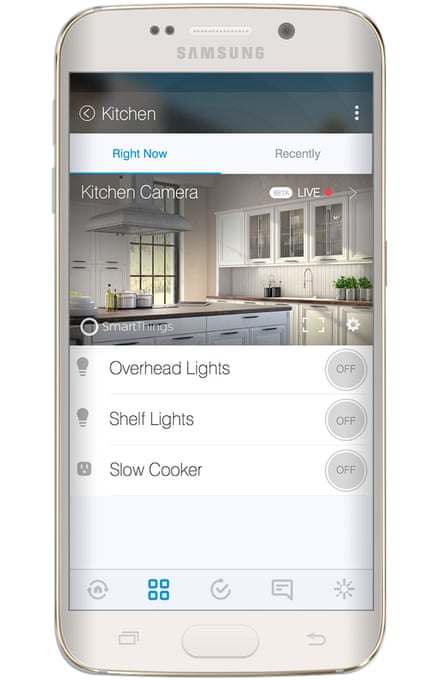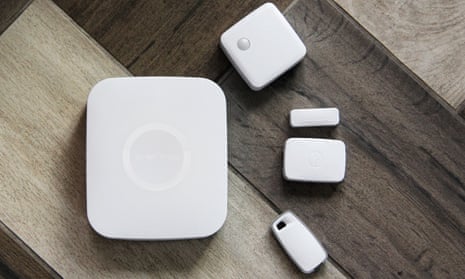Samsung has launched a new hub for smarthome devices, which it hopes will kickstart the evolution of the internet of things (IoT).
Its Hub will securely unite sensors and accessories from a range of manufacturers using the SmartThings open system.
The device and service will be available from 10 September, andfollows Samsung’s acquisition of the IoT company SmartThings in April last year.
The internet of things is the idea of creating a home where everything is connected to the internet, creating “swarm intelligence” from individually dumb devices. Bins, toasters, washing machines and lights will be able to talk to each other for automatic, more efficient control and monitoring.
Lights could talk to the heating system or door to know when you’re home. A fridge could detect when the milk is empty and order another pint, or the security camera could turn on all the lights if it detects an intruder.
The Hub will work with a range of SmartThings-branded devices as well as other products from Samsung and accessories from Bose, Philips, Honeywell, Yale, LIFX, Aeon and others.
Samsung’s president of UK and Ireland Andy Griffiths said: “We believe a connected home will provide users [with] more information, more piece of mind and more control in their lives – but privacy is fundamental.
“The whole thing is encrypted end-to-end – think bank-level security – while we have continuous security checks and third-party auditing. Only you will have access to any data stored in the cloud.”
Samsung will sell a starter pack costing £199 with the Hub, a door closer sensor, a motion sensor, a presence sensor and a power outlet switch for turning something else on and off. A range of other SmartThings devices including a moisture sensor, a camera and a sleep monitor will also be available for around £30 each, with more in the pipeline for next year.
But the Hub will also talk to a range of other devices from other manufacturers and will be open to other companies to link into.
“We have a different philosophy for our IoT vision, not hidden behind a walled garden, but open and interoperable with many devices,” said Griffiths.

The whole system will be controlled by a SmartThings app, which will be available for Android, iOS and Windows Phone, making it one of the systems with the most cross-platform support.
The Korean company is also attempting to foster a community of developers who are free to create new apps and new integrations with products beyond the original launch platform.
Samsung has also pledged to make 100% of its devices, from TVs and sound systems to washing machines and fridges, internet connected within five years, which will all integrate into the SmartThings Hub.
Samsung isn’t alone in attempting to secure a foothold in the burgeoning IoT space. Apple launched its HomeKit system last year and is expected to push it heavily this year with its new iPhone and iPad software iOS 9.
Google also launched its own IoT platform based on Android, called Project Brillo, over the summer to complement its Nest group of products, while many others have built apps and devices that connect to control certain aspects but cannot integrate with other devices.
“We’re entering a whole IoT era, starting this year, and it will increasingly become the norm in the next three to five years. What we’re doing is appealing to the early adopters,” said Griffiths.
Watch out Siri: Amazon turns page on future of voice assistants with Alexa









Comments (…)
Sign in or create your Guardian account to join the discussion